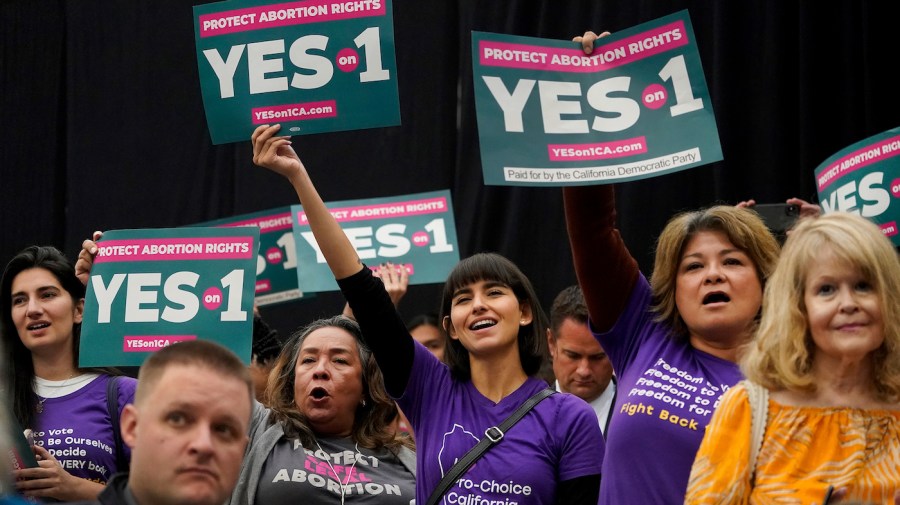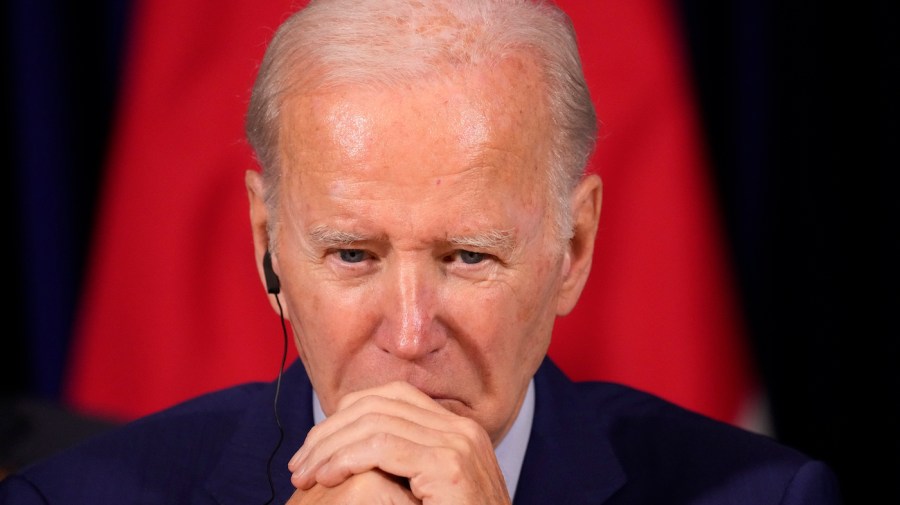Five lessons from the midterm exit polls
The dust is beginning to settle from the 2022 midterm elections, with Democrats holding the Senate and control of the House soon to be decided for sure.
As the results sink in, questions about what drove those results grow sharper.
Some of the answers can be found in the exit polls. Here are five big lessons.
Abortion was a huge issue

Supporters of the YES on Proposition 1 hold a rally at Long Beach City College in Long Beach, Calif. on Nov. 6, 2022.
Abortion was a vital factor in securing a better performance for Democrats than almost anyone expected.
Abortion was always going to have some impact on the midterms, given that the Supreme Court had overturned Roe v. Wade less than five months before Election Day.
But in the campaign’s closing stages, polls had suggested the economy was overpowering reproductive rights as a decisive factor in voters’ minds, to the GOP’s benefit.
The exit polls told a different story.
Twenty-seven percent of voters said abortion was the single most important issue in determining their vote — only just behind inflation, which was listed by 31 percent of voters.
Those who chose abortion as their top issue broke more than 3 to 1 for Democrats. Seventy-six percent of them voted for President Biden’s party and 23 percent for Republicans, according to the main national exit poll.
The political impact of abortion was even more pronounced in some high-profile races.
In the Senate contest in Pennsylvania, abortion was named as the top issue by a plurality of voters. The 37 percent of Pennsylvanians in that category voted almost 4 to 1 for Democrat John Fetterman over Republican Mehmet Oz.
Voters in five states — California, Kentucky, Michigan, Montana and Vermont — had the chance to weigh in on ballot measures pertaining to abortion. The pro-abortion rights side prevailed in all five.
In Michigan, an abortion-related ballot measure clearly boosted incumbent Democratic Gov. Gretchen Whitmer, a strong advocate for reproductive rights.
A striking 45 percent of voters in Michigan’s gubernatorial race named abortion as their top priority — far higher than any other issue. Those voters broke 77 percent to 22 percent for Whitmer over her Republican opponent, conservative commentator Tudor Dixon.
Whitmer, who Republicans had believed to be vulnerable, won reelection by more than 10 points.
Trump was a big drag on the GOP

Trump talks with people at Mar-a-lago on Election Day on Nov. 8, 2022, in Palm Beach, Fla.
Former President Trump has spent plenty of time since Tuesday defending himself from the charge that he had a negative impact upon his party.
But the evidence cuts the other way.
High-profile Trump endorsees like Oz and Nevada’s Adam Laxalt went down to defeat.
Candidates who endorsed Trump’s false claims of election fraud pertaining to 2020 fared especially badly.
Doug Mastriano lost the gubernatorial race in Pennsylvania by double digits, as did Dixon in Michigan.
Don Bolduc, the Republican senatorial candidate in New Hampshire, who had backed Trump’s erroneous claims and then reversed himself upon winning the GOP primary, lost to Sen. Maggie Hassan (D) by 10 points.
For all of Trump’s bluster, the verdict of the exit polls was equally emphatic.
Fifty-eight percent of voters said they held an unfavorable view of the former president, against 39 percent who viewed him favorably. The vast majority of those viewing Trump unfavorably voted for Democratic candidates.
It’s a crucial time for Trump. His big announcement — widely assumed to be the launch of a 2024 campaign — is looming at Mar-a-Lago on Tuesday. Florida Gov. Ron DeSantis (R) is emerging as a formidable potential rival for the 2024 GOP nomination.
But the verdict on Tuesday was clear — and negative for the former president.
Republicans keep making inroads with Latinos

Republican National Committee Chair Ronna McDaniel gives remarks to a packed room at the opening of the RNC’s new Hispanic Community Center in Suwanee, Ga., on June 29, 2022.
One of the big demographic trends of recent years has been the erosion of Latino support for the Democratic Party.
On Tuesday, DeSantis became the first Republican gubernatorial candidate in two decades to carry Miami-Dade County, a Cuban American stronghold that is roughly 70 percent Hispanic.
On the other hand, Democrats won two of three heavily Hispanic House districts in south Texas that the GOP had targeted.
The exit polls suggest the Latino vote continues to shift, especially among men.
Democrats carried Latino men by just 8 points over Republicans, 53 percent to 45 percent, according to the national exit poll. The margin had been 29 points as recently as the 2018 midterms.
Among Latinos overall, the Democratic advantage came in at 21 points, compared to 40 points in 2018.
Democrats were, of course, buoyed by the overall midterm results. But the problem posed by an erosion of Latino support is not going away.
Voters agree democracy is under threat — but can’t agree on why

Ahead of the midterm elections, a mobile billboard reading “Protect our Freedoms Say No To Democracy Deniers: Laxalt, Lombardo, Marchant” travels down the Las Vegas Strip on Friday, Nov. 4, 2022 in Las Vegas.
Fears of significant violence or chaos at polling places on Tuesday did not materialize. Even candidates who had equivocated about the result of the 2020 election accepted their own outcomes, for the most part.
But that doesn’t alter the fact that the fabric of American public life has become very frayed.
According to exit polls, more than two-thirds of all voters believe democracy in America is either “somewhat threatened” or “very threatened.”
Even those voters split down the middle in terms of their voting behavior.
Precisely half the voters who said democracy was “very threatened” voted for Republican candidates, while 48 percent voted for Democrats.
The message is obvious: lots of Americans believe democracy is in danger, but they have contrasting views about where the threat is coming from.
For Democrats, the danger lies with Republican election-deniers and conspiracy theorists, as well as with Trump himself.
But 35 percent of all voters in the midterms didn’t believe that Biden won his 2020 election legitimately. Unsurprisingly, almost all of them voted Republican.
Roughly 1 in 5 voters said they were either “not very confident” or “not at all confident” that their state’s results would be fair and accurate. They, too, went overwhelmingly for the GOP.
Biden had a great night — but voters don’t want him to run again

U.S. President Joe Biden listens during a meeting with South Korean President Yoon Suk Yeol and Japanese Prime Minister Fumio Kishida during the Association of Southeast Asian Nations (ASEAN) summit on Nov. 13, 2022, in Phnom Penh, Cambodia.
Biden had as good a night as he could have hoped Tuesday.
It got better for him from there. On Saturday evening, when multiple news organizations projected that Sen. Catherine Cortez Masto (D-Nev.) would retain her seat, it ensured that Democrats would hold the Senate, regardless of what happens in the Georgia runoff set for December. The Republican majority in the House, if it comes into existence at all, will be very slim.
Only two presidents since the Second World War, John F. Kennedy in 1962 and George W. Bush in 2002, have avoided losses in the Senate and held House losses below 10 seats in their first midterms.
Biden appears poised to join them.
But the exit polls suggest he should not feel too secure just yet.
A huge 67 percent of all voters don’t want Biden to seek a second term. Just 30 percent do want him to run again.
That’s not just a partisan issue. Among those who hope Biden bows out, 31 percent voted for Democrats in the House.
Copyright 2023 Nexstar Media Inc. All rights reserved. This material may not be published, broadcast, rewritten, or redistributed. Regular the hill posts







